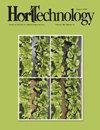A Rose Is a Rose Is a Rose... Or Is It? Ecotypes versus Locally Sourced Plants for Aquatic Habitat Restoration and Enhancement Projects
IF 1.3
4区 农林科学
Q3 HORTICULTURE
引用次数: 1
Abstract
Horticulturists and agronomists have a long history of using selective breeding to take advantage of intraspecific (within-species) variation with the goal of developing novel varieties of plant species. These efforts are responsible for the availability of countless improved food, forage, and ornamental varieties that are valued by farmers, landscapers, and home gardeners. In contrast, little attention has been paid to the idea of evaluating intraspecific variation to identify plants derived from a specific ecosystem (ecotypes) of native species that could improve the success rate of habitat restoration and enhancement projects, especially in aquatic systems. These projects often specify that plant material used for restoration be collected from local donor sites to preserve the area’s gene pool, but nearby source populations may be nonexistent or may not be well-adapted to conditions at the recipient (transplant) site. This paper, which summarizes information presented at the American Society for Horticultural Science Invasive Plants Research Professional Interest Group workshop in 2022, provides evidence that unimproved, wild-type species can be useful in aquatic habitat restoration and enhancement projects, particularly when conditions at sites targeted for restoration differ from those in nearby systems, or when sites are expected to undergo shifts in conditions because of factors such as climate change.玫瑰是玫瑰,玫瑰是玫瑰……还是真的?生态类型与本地来源植物在水生生境恢复和增强项目中的比较
园艺学家和农学家利用种内(种内)变异,以开发植物物种的新品种,有着悠久的历史。这些努力促成了无数改良食品、饲料和观赏品种的供应,这些品种受到农民、园林设计师和家庭园丁的重视。相比之下,很少有人关注评估种内变异的想法,以确定源自本地物种特定生态系统(生态型)的植物,从而提高栖息地恢复和增强项目的成功率,特别是在水生系统中。这些项目通常规定,用于修复的植物材料是从当地的捐赠地收集的,以保护该地区的基因库,但附近的来源种群可能不存在,或者可能不太适应受体(移植)地的条件。这篇论文总结了2022年美国园艺科学学会入侵植物研究专业兴趣小组研讨会上提供的信息,提供了证据,证明未经改良的野生型物种可以用于水生栖息地的恢复和增强项目,特别是当恢复目标地的条件与附近系统的条件不同时,或者由于气候变化等因素,场地预计会发生条件变化。
本文章由计算机程序翻译,如有差异,请以英文原文为准。
求助全文
约1分钟内获得全文
求助全文
来源期刊

Horttechnology
农林科学-园艺
CiteScore
2.30
自引率
10.00%
发文量
67
审稿时长
3 months
期刊介绍:
HortTechnology serves as the primary outreach publication of the American Society for Horticultural Science. Its mission is to provide science-based information to professional horticulturists, practitioners, and educators; promote and encourage an interchange of ideas among scientists, educators, and professionals working in horticulture; and provide an opportunity for peer review of practical horticultural information.
 求助内容:
求助内容: 应助结果提醒方式:
应助结果提醒方式:


